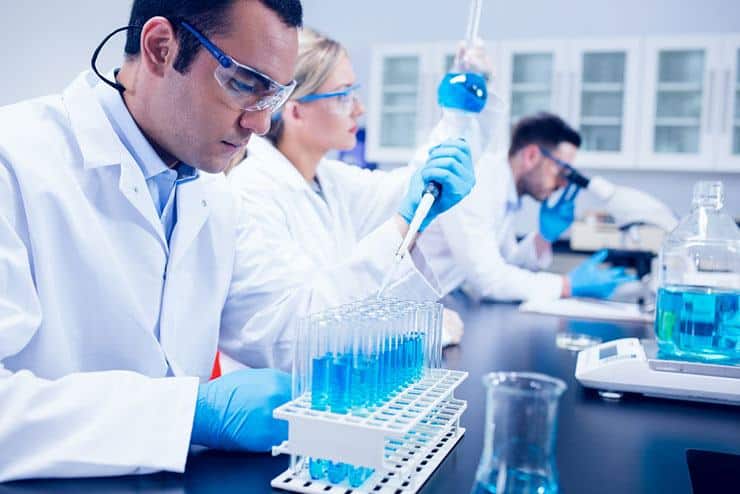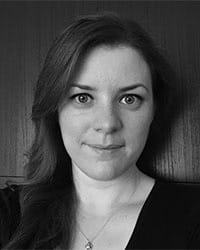What is a Biochemist?
Biochemists are typically lab-based professionals who study and explore the chemical processes occurring within living things. They are employed across a wide range of industries and within academia. Many Biochemists are employed within research but there are also opportunities in product development and some specialized manufacturing environments.
What is Biochemistry?
Biochemistry is the professional meeting point of chemistry and biology. It focuses on the chemical processes that happen naturally within living organisms – trying to solve biological problems through understanding chemical properties.
Biochemists can study across a wide range of organisms including humans, animals, plants, viruses, and bacteria. They can study and monitor “normal” chemical processes as well as observing how these processes are changed by a disease state or intervention. They may also be tasked with trying to change some chemical processes to produce an alternative output.
Generally, Biochemists are working to optimize positive characteristics and decrease negative characteristics across a specific organism.
If working in an industry (such as food, biotechnology, medical diagnostics or laboratory services), Biochemists are typically working towards optimization of a product.
What Does a Biochemist do?
The specific tasks of a Biochemist will depend upon their area of study or expertise. Typically involved in research or development, tasks may include:
- Planning experiments
- Developing new tools or equipment as necessary
- Conducting experiments
- Close adherence to both internal SOPs and relevant external regulations
- Troubleshooting problems with laboratory equipment
- Monitoring and recording experimental results
- Analysis of results and writing of reports
- Presentation of research findings
- Management or supervision of junior laboratory staff
Biochemists can also be involved in a production or manufacturing team within certain highly regulated industries such as diagnostics or biotechnology. In this type of role, biochemists will typically sit within the quality department. Tasks might include:
- Monitoring certain parts of a manufacturing process
- Providing specialist quality control testing to a manufacturing team
- Testing of product safety and assuring adherence to predetermined standards
- Working closely with the manufacturing team members to solve any problems that arise
This is an extremely important function within highly regulated industries as their work confirms the safety, effectiveness, and reliability of a product. If working in this sort of role, Biochemists might be required to follow specialist manufacturing guidelines such as wearing personal protective equipment within a cleanroom environment.
Becoming a Biochemist
Individuals looking to become Biochemists will typically have a third level qualification in a relevant scientific discipline (e.g. BSc Biochemistry or similar). For those looking to enter academia, postgraduate courses are available. For those looking to begin a career in industry, some companies will offer graduate schemes or entry-level positions.
If you are already a Biochemist but want to retrain for other science roles in Development, Manufacturing, and Quality in the Pharmaceutical manufacturing industry, check out our Conversion Course into Science Roles in Pharma.
Depending on your previous experience, here are some of the most common job titles we see advertised;
- Quality control – QC Specialist, QC Analyst, QC Scientist, QC Specialist – LIMS, Quality Control Biochemist Analyst, Quality Control Analyst FTC, Senior Quality Control Analyst, QC Micro Technician, QC Drug Product Technologist, QC Stability Co-ordinator (Senior Analyst).
- Quality assurance – QA Specialist, QA Internal Auditor, QA Compliance Specialist, QMS/QA Specialist, QA Compliance Manager, QA Specialist – Raw Materials
- Development – Tech Transfer Scientist Jobs, Process Technology Transfer Scientist, Transfer Scientist, Product and Process development scientists
- Science roles that support manufacturing – Particle Analyst, Environmental Scientist, Production Scientist, Process Scientist / Specialist – Purification, Process Scientist / Specialist – In-Process Control
What Skills Do I Need?
The ideal skill set for someone moving into Biochemistry includes::
- Laboratory skills – even entry-level jobs will expect a level of lab experience from degree level study
- Organisational skills – projects and experiments need to be completed within the timescales given to keep larger deliverables and schedules on time
- Written communication skills – report writing, record keeping communication with other team members are important parts of the role
- Verbal communication skills – must be able to discuss scientific ideas with stakeholders across teams and at all levels
- Problem-solving skills – ability to find new ways of tackling a problem and finding innovative solutions is important in both academic and industrial settings
Biochemist Salaries & Job Growth
Check out our salary guide for Biochemist salary information local to you.
Biochemist Resume Tips
As with all resumes, it’s extremely important that you tailor your Biochemist resume to reflect the language used within the job advert. Where you have relevant experience or skills, use the words and phrases that the employer has used to describe them. Do not assume that someone will read similar wording and know what you mean.
Biochemist roles will typically be looking for the skills previously outlined:
- Laboratory skills
- Organisational skills
- Written communication skills
- Verbal communication skills
- Problem-solving skills
For more help with your resume, check out these templates and this list of 30 tips to improve your resume.
Biochemist Job Vacancies
For more information on currently available Biochemist roles near you, head to our jobs boards and select Science in the “Jobs by Category” menu. We currently have job boards for Ireland and the UK.
23 Other Types of Pharma Job Roles
Manufacturing/Production
- Process Technician
- Process Operator
- Manufacturing Technician
- Packaging Operator
- Production Supervisor
Engineering
- Process Engineer
- Manufacturing Engineer
- Instrumentation Engineer
- Project Engineer
- Automation Engineer
Maintenance
Quality
Science/Laboratory
Validation
Our Most Popular Programs and Courses
- Equipment Validation Training Course – for Starter Validation, CQV and C&Q Roles
- Pharmaceutical Validation Training Course – for more Senior Validation, CQV and C&Q Roles
- Computer System Validation Training Course
- GMP Training for the Pharmaceutical Industry
- View All 13 Pharmaceutical Training Courses
About the Author
Claire Wilson
Content Marketing and Career Coaching
Claire runs GetReskilled’s Advanced Career Coaching Programme – our specially devised job hunting course that helps our trainees take that final step into employment by leading them through the job hunting process. She is extremely enthusiastic about helping people reach their final goal of employment in their new career path.
Claire has a BSc (Hons) in Medical Biology from Edinburgh University and spent 7 years working in the pharmaceutical and medical device industries.
Donagh Fitzgerald
Head of Marketing & Product Development
Mechanical/Production Engineer
Donagh looks after the marketing and product development including the training and pedagogical elements of our programs and makes sure that all GetReskilled’s users can have a great online learning experience. Donagh has lived and worked in many countries including Ireland, America, the UK, Singapore, Hong Kong and Japan. Donagh has also served as the Program Manager for the Farmleigh Fellowship based out of Singapore.
Donagh holds Degrees in Production Engineering and Mechanical Engineering from South East Technological University, Ireland.



Post Your Comments Below